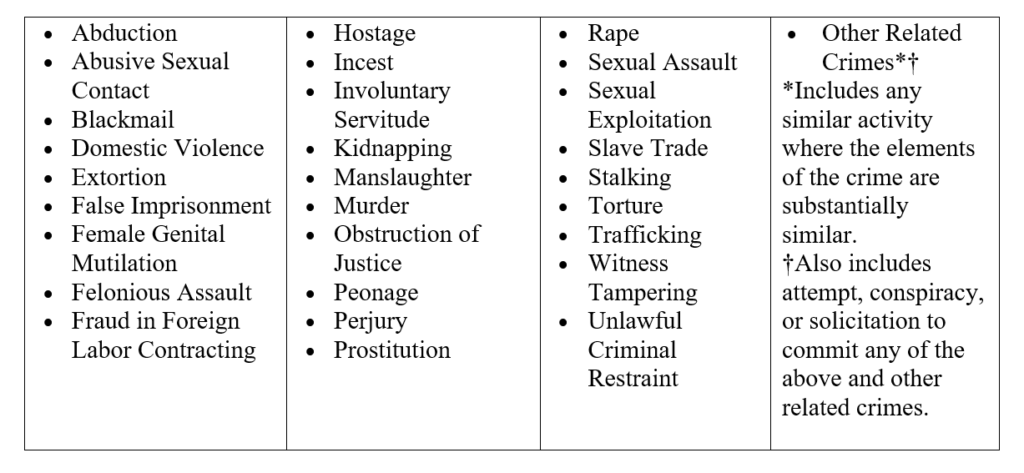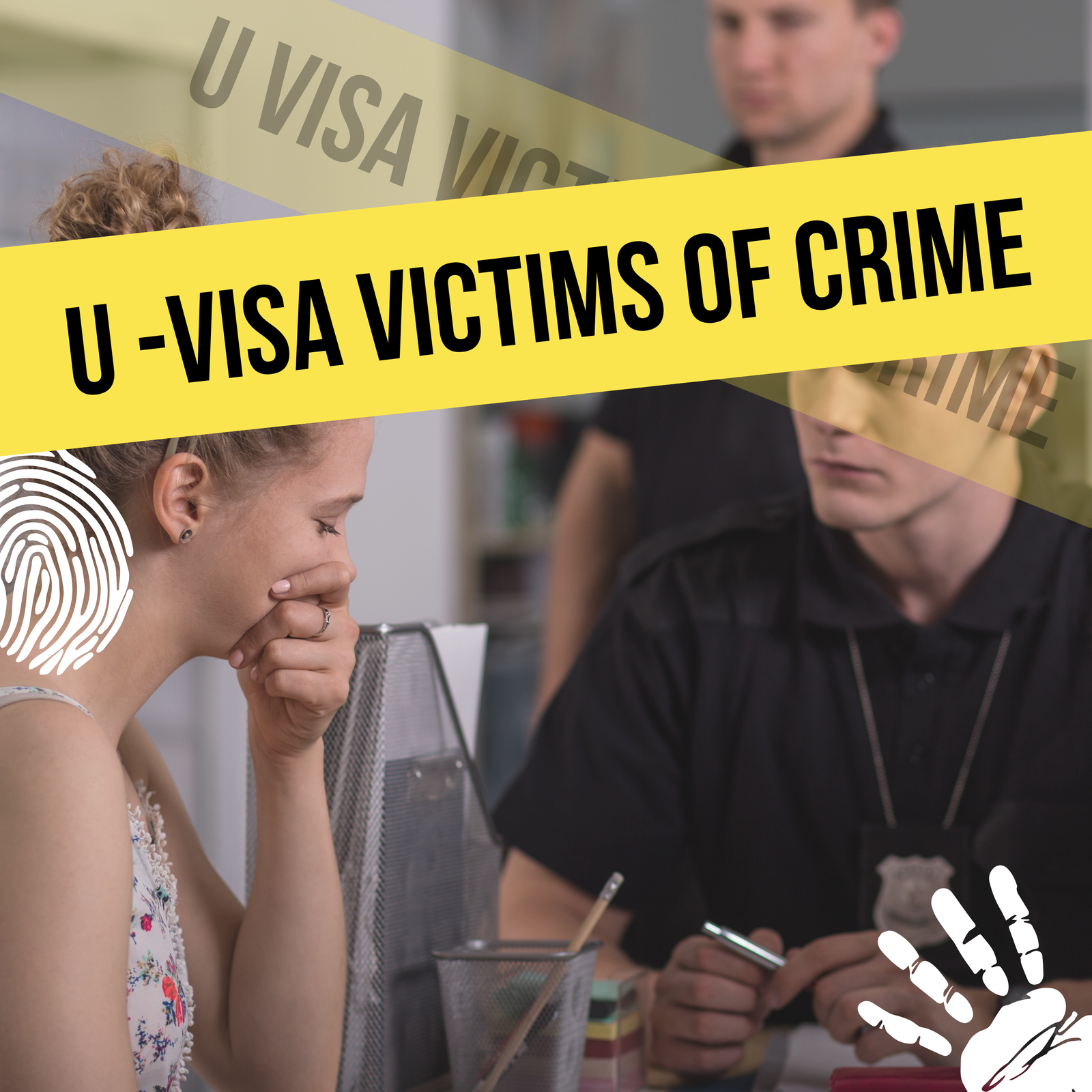The U visa is an immigration benefit that can be sought by victims of certain crimes who are currently assisting or have previously assisted law enforcement in the investigation or prosecution of a crime, or who are likely to be helpful in the investigation or prosecution of criminal activity.
The U visa provides eligible victims with non-immigrant status to temporarily remain in the United States (U.S.) while assisting law enforcement. Upon meeting the conditions as indicated below, the applicant and his or her family members would be eligible to apply for a Green Card.
1. When are you eligible for a U visa?
You may be eligible for a U non-immigrant visa if all the requirements set out below are satisfied:
- You are the victim of qualifying criminal activity;
- You have suffered substantial physical or mental abuse, as a result of having been a victim of criminal activity;
- You have information about the criminal activity;
- You were helpful, are helpful, or are likely to be helpful to law enforcement in the investigation or prosecution of the crime; and
- The crime occurred in the United States or violated U.S. laws.
U.S. Citizenship and Immigration Services (USCIS) will not provide a U visa to those petitioners who, after initially cooperating with law enforcement, refuse to provide continuing assistance when reasonably requested.
2. What constitutes a qualifying crime?

Source: https://www.uscis.gov/humanitarian/victims-of-criminal-activity-u-nonimmigrant-status
3. What constitutes substantial physical and mental abuse?
Factors that USCIS uses to make this determination of substantial physical and mental abuse are:
(a) the nature of the injury inflicted;
(b) the severity of the perpetrator’s conduct;
(c) the severity of the harm suffered;
(d) the duration of the infliction of the harm; and
(e) the extent to which there is permanent or serious harm to the appearance, health, or physical or mental soundness of the victim.
The existence of one or more of these factors does not automatically signify that the abuse suffered was substantial. The victim will have to provide evidence to USCIS showing that the victim meets the standard of substantial physical or mental abuse. USCIS will make the determination as to whether the victim has met the “substantial physical or mental” standard on a case-by-case basis during its adjudication of the U visa petition.
4. What is the process of applying for a U visa?
If an individual believes he or she may qualify for a U visa, then that individual or his or her representative will complete the USCIS Form I-918, Petition for U Nonimmigrant Status (Form I-918), and submit it to USCIS with all relevant documentation, including Form I-918B, the U visa law enforcement certification. As part of the submission, affidavits will also have to be obtained from friends, relatives or any other person who was privy to the incident or the individual’s psychological status before and after the incident. Given the complexity of U visa petitions, petitioners often choose to work with a legal representative.
5. What is a U visa certification?
USCIS Form I-918, Supplement B is the U visa certification document that a law enforcement agency can complete for a victim who is petitioning USCIS for a U visa. Form I-918B is a required piece of evidence to confirm to USCIS that a qualifying crime has occurred, and that the victim was helpful, is being helpful, or is likely to be helpful in the investigation or prosecution of criminal activity. To be eligible for a U visa, the victim must submit a law enforcement certification completed by a certifying agency. Certifying agencies include all authorities responsible for the investigation, prosecution, conviction or sentencing of the qualifying criminal activity. Without a completed U visa certification, the victim will not be eligible for a U visa.
6. What are the benefits of the U Visa?
If found eligible and a petition is approved, a U visa recipient receives nonimmigrant status to live and work in the United States for no longer than 4 years. Qualified recipients may apply to adjust status to become a lawful permanent resident (green card) after 3 years of continuous presence in the U.S. while having a U visa. The petitioner will have to meet other eligibility requirements for a green card as well, including the ongoing duty to cooperate with law enforcement and not unreasonably refuse to assist with the investigation or prosecution of the qualifying crime. Additionally, certain immediate family members of U visa recipients may also be eligible to live and work in the United States as derivative U visa recipients based on their relationship with the principal recipient.
7. How many U Visas are available every year?
The federally mandated cap on the number of available U visas is 10,000 per fiscal year. To partially alleviate the lengthy wait, USCIS can grant ‘deferred action’ to immigrants who have gone through the application process and whose cases have been approved, but for whom no visa is yet available. Once a deferred action is obtained, the individual is eligible to apply to USCIS for work authorization. However, one can expect to wait several more years even in deferred action status before receiving the actual U visa.
8. How long does it take for a U Visa to be approved?
It currently takes up to approximately 6 years for USCIS to fully process U visa applications. However, you should view that estimate as a guideline, not a guarantee. The amount of time USCIS takes to process a Form I-918 can vary widely, depending on the particulars of your case.
9. When can you be eligible for a Green Card based on a U visa?
You might be eligible to apply for permanent residence after meeting the following requirements:
(a) you have been physically present in the U.S. continuously for at least 3 years;
(b) you have not unreasonably refused to cooperate with the U.S. law enforcement officials investigating and prosecuting the crime against you; and
(c) your continued presence in the U.S. is justified either on humanitarian grounds, to ensure family unity, or is in the public interest.
10. What should you do if you are interested in applying for a U Visa?
As a first step, reach out to counsel with a short narrative of the incident. Also remember to share a copy of the police report for counsel to evaluate your eligibility for a U visa
Somireddy Law Group PLLC offers such customized and client-oriented services to assist you with preparing and filing your U visa application. Please feel free to reach out to us at: info@somireddylaw.com or u-visas@somireddylaw.com.


Write a Comment